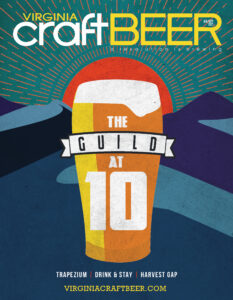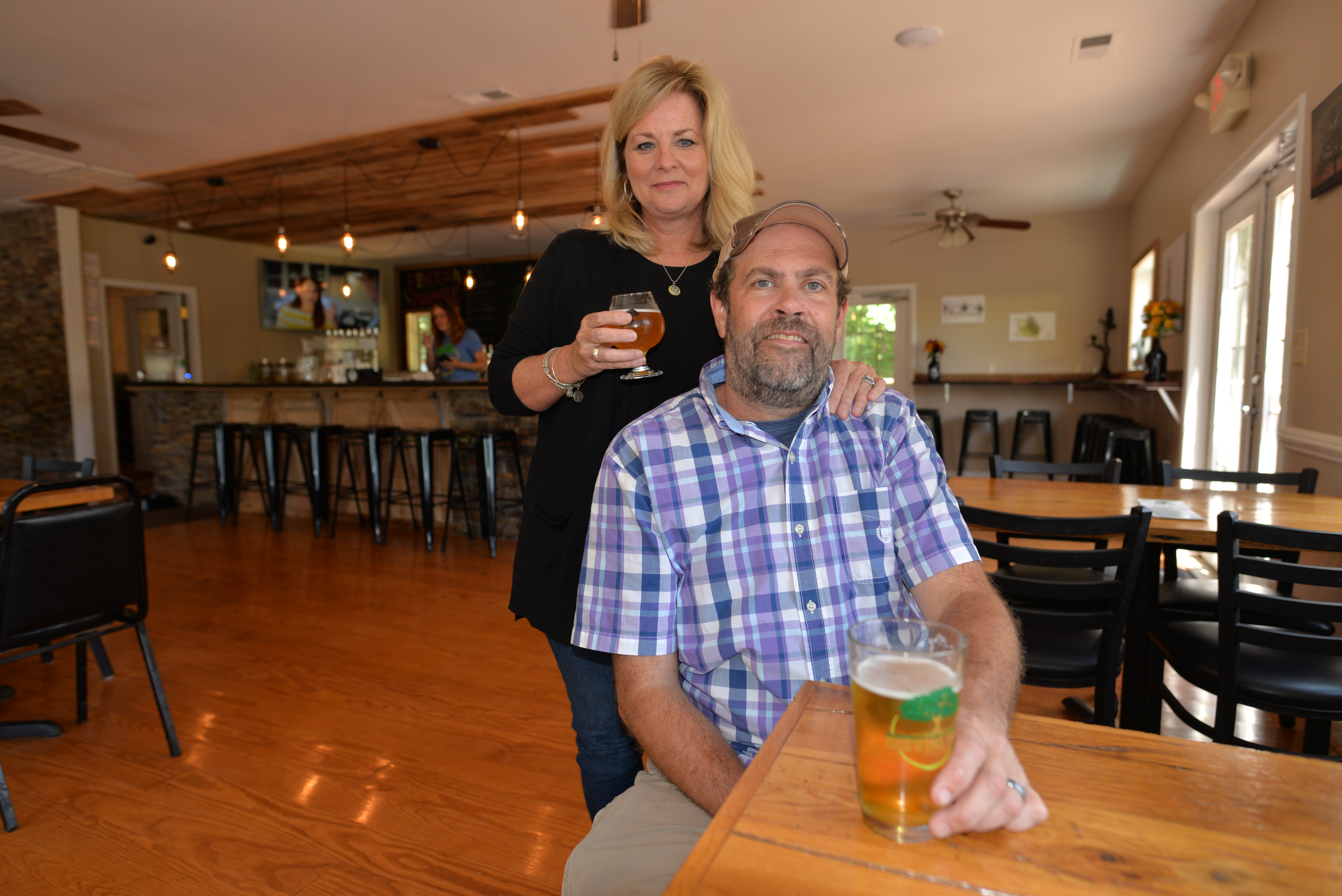
(Gina and Mark Thompson are at home in The Brewing Tree Beer Company tasting room in rural Afton, VA)
By Jeff Maisey
After announcing his return in an exclusive interview with Virginia Craft Beer Magazine on New Year’s Day, pioneering Virginia craft brewer Mark Thompson now has his Brewing Tree Beer Company is up and running.
The charismatic Thompson is brewing again after three-year contractual hiatus. Before his “retirement,” Thompson spent 23 years in the craft beer industry.
Thompson earned his Bachelor of Science Degree in Biology from James Madison University, and then moved to Portland, Oregon where he worked in the craft beer industry during the mid-1990s.
Thompson returned to his native Charlottesville, in 1999, and co-founded Starr Hill Brewery with Kristin Dolan. The brewery was named for the C-Ville neighborhood in which it was originally located. Starr Hill moved to its current location in Crozet in 2005.
Thompson was indeed a pioneer in Virginia’s new Renaissance of craft beer and was instrumental in creating the Brew Ridge Trail (Virginia’s original beer trail) as well as the Virginia Craft Brewers Guild. It was the combined work of Thompson and a small group of Virginia breweries that garnered the introduction and passage of SB604, in 2012, that allowed for the successful explosion of the craft brewery industry today.
Thompson lamented late in his Starr Hill career that the success and growth of the award-winning brewery caused him to miss the days when he was just a small-time brewer, tossing kegs in the back of his pickup truck. He wanted one day to return to his modest roots. Now, that time has come.
On January 2, Thompson acquired the Blue Toad Hard Cider Pub & Tasting Room property in Afton, Virginia, located on the famed Route 151 in Nelson County – yep, Brew Ridge Trail.
Thompson’s new micro-brewery is called The Brewing Tree. His focus will be on creativity and innovation, producing four core beers to be consumed only onsite, with no plans to package or mass distribute. Thompson also plans to invite brewers from all over to collaborate on special, unique one-off beers.
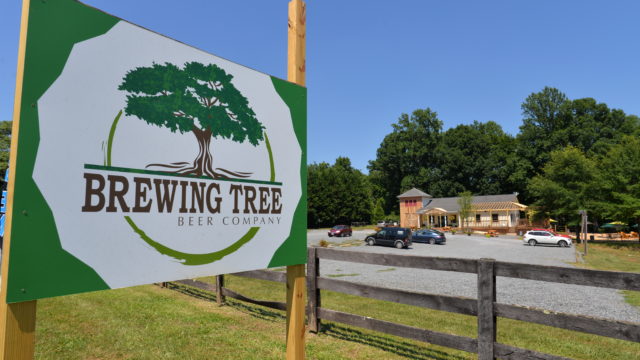
(A new sight on Nelson County’s famous Route 151 — Brew Ridge Trail)
Mark Thompson’s Chapter 2 in Virginia brewing is enhanced with the help of his wife Gina. Mark and Gina, both age 52, met in Virginia Beach when restauranteur Laura Habr of Croc’s 19th Street Bistro encouraged the two dynamic personalities to star in a unique 5-course dinner event. Gina was a regional sales rep for a wine and beer distributor at the time. The “He Said, She Said” dinner was like Paul McCartney’s “Venus & Mars” rock show, full of fun and excitement. During the dinner, as each course was served, Gina would passionately explain why the wine pairing was a better fit than one of Thompson’s craft beers. Thompson, of course, gave an over-the-top rebuttal. Whoever said beer and wine don’t mix certainly didn’t know Mark and Gina.
In mid-July I drove out to see my blissful friends, Mark and Gina Thompson, to share a beer or two, many laughs, and to tour their beautiful facility and surrounding 5-acre property.
As you will read in the following interview, the key ingredients of The Brewing Tree are to remain small, contract brew down the street rather than possess a large brewhouse, develop true-to-style beers, benefit local non-profits, and put the spotlight on the experience of the natural beauty, rural, outdoor setting.
VCB: You have returned from a nearly 3-year hiatus. What did you do during that time? Why have you returned to brewing?
Mark Thompson: I started Starr Hill Brewing Company in September of 1999, after a local kid from Charlottesville went out west to Portland, Oregon, where he learned to make beer in the early ‘90s, then Denver, Colorado in the mid-90s. I came back to start Starr Hill when there were seven breweries in the state.
I grew Starr Hill to be the largest craft brewery in the state, and in many ways felt we had accomplished all that I could and all I needed to accomplish. I decided to retire and sell my equity back to my business partner, and take a couple years off. I had a non-compete, so I couldn’t work in the beer industry for two years.
So, I took two years off; got married to my lovely wife, Gina. I was living in Virginia Beach for a year or so and then we moved up here.
This property became available on Nelson’s 151. It made such logical sense to parlay the little bit of retirement money I had gotten from Starr Hill and buy this piece of property.
VCB: Did you miss the craft beer business during your time away, or did it feel good to take a step back after so many years of brewing?
MT: Well, yes and no.
At first, your ego overrides things. I missed it early on. But having three years to reflect upon by retirement from Starr Hill, I was not enjoying myself nearly as much as when I first started. I realized that I like small. I like creative. I like talking to consumers who come in.
As a company grows, some people thrive on that and that’s what they want to do. Others, like myself, decide that’s not where I want to be. The larger the company got the more miserable I became.
In some ways it’s ironic. When I talk to some of the other successful brewers along the corridor here you can really see some of that same evolution. The reason we all got into the craft beer world was for passion. It wasn’t about getting rich. It was the creativity and the passion.
Now it’s like the Talking Heads song: “This is not my beautiful house, this is not my beautiful wife.” It changes and becomes something else. For certain personality types, I would argue, it’s not quite as fun when the creativity decreases and the scope and the scale get larger and larger as the ferris wheel just keeps spinning around faster and faster. For me it was time to get off the ferris wheel.
I took a few years off, gardened, fished, and now I’m back.
VCB: Why did you call the new business The Brewing Tree Beer Company?
MT: The Brewing Tree name came from the coaching analogy of coaching tree, where the head coach has a lot of assistant coaches that go on to become head coaches on their own.
As you know, I’ve done craft beer since 1992. I feel I have worked with, mentored, trained and helped so many.
One of our missions is that our brewery will always have a collaboration beer on tap and we’ll always have a guest tap. I have accomplished enough in the craft beer world that my ego isn’t so big. If I find a couple kegs from a brewery that I think are phenomenal, I’m going to buy a couple of those kegs for our guest tap.
Our first collaboration here at The Brewing Tree was with Levi Duncan, who is now the head brewer at Champion Brewing Company in Charlottesville. He worked under my tutelage at Starr Hill for six years. He’s now a judge at the Great American Beer Festival. Levy Duncan is a prime example of what The Brewing Tree stands for — that collaboration, working together so a tide rises all boats. We did a Helles lager, which translates in German to “friendship.”
VCB: And not always the easiest beer style to get right.
MT: No, but Champion does lagers extremely well. Their Shower Beer is one of the flagships. They have a standard of high quality.
I’m working on my second collaboration project now, which will probably be with PRN (Pro Re Nata Farm Brewery). I have a couple more in the works, so again the collaborative aspect for me and where I am in my brewing career is what we’re doing.
The business model for what we’re going is we’re doing some contract brewing with Seven Arrows. Craft beer demand is softening and flattening a little bit. There is now so much brewing capacity in the market — in Virginia — it didn’t make any sense to add more.
Here at The Brewing Tree we wanted to spend our money on the environment and the setting, but I didn’t feel as a business owner any need to add an additional 10,000 barrels of brewing capacity to a market that is already flooded with capacity. So were doing contract brewing with our core beers.
We are starting the process of introducing our small house beers. We have a Dogfish Head model of a Sabco Brew-Magic half-barrel, 15-gallon pilot system with two fermentors. That allows Gina and I the ability to play and create, but not have to be a slave to the machine.
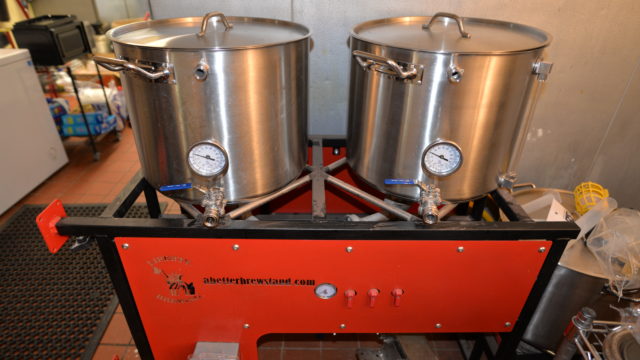
(Mark Thompson’s brew kitchen is for recipe development and test batching)
VCB: And you don’t need the dry and cold storage space on-site, right?
MT: With the new generation of brewers coming into the market, there’s so much demand. You’re the new brewery. People love your beer.
That initial million dollars you scraped together to get your brewery open, then you’ve got to come up with two million dollars because people love your beers.
You’re like, “Yeah, man. They love me — woo.”
Then that two million becomes four million, and that becomes eight, then 16. The next thing you know you’re in a scenario where the debt far outweighs the benefit. It’s very expensive to grow in a capital intensive industry like beer with the packaging, manufacturing, stainless steel.
So there’s a real dual-edge sword to the growth curve, and I thing part of what you’re seeing — without mentioning any names — is this contraction.
Green Flash at the Beach is a great example. They sunk a pretty penny and then all of a sudden…
Craft beer, with the wholesalers, retailers, it’s a low margin, high volume game. Just because you get bigger because there’s demand for your product doesn’t mean you’re going to become rich. You can grow all you want, but if the debt keeps rising you’re dead.
I read recently was big grocery chains like Publix in Florida said, “You know what? What matters to us as a big grocery chain is we hate out-of-stock. We like on-time delivery. We want merchandisers to come into our stores seven days a week. We’re not going to chase the flavor of the month. It doesn’t help our business because beer is 10 percent of the total alcohol sold.”
Then you have large conglomerate wholesalers coming in with this whole portfolio, saying, “Let me take care of your needs.”
That is the trend that is blossoming now that is particularly dangerous to independent craft beer and breweries trying to grow their business through chain grocery in the south.
The growth in craft is happening in the small tasting room model.
When I was doing the business model for The Brewing Tree, the irony is that I can make more profit selling 500 barrels of beer in my tasting room than I could sell in 25,000 barrels of beer at a large production facility through wholesalers. You keep your expenses low; your staff low; equipment costs low.
VCB: Let’s talk about your core beers. Vienna lager is a popular style here on Route151. Why did you include Philinda Vienna Lager as one of your first four cores?
MT: I used to make a beer called Jomo Lager, which in many ways was very similar to the Vienna Lager. Vienna Lagers are very popular. Devils Backbone does make the best, most award-winning Vienna Lager ever made.
Consumers like the lighter style beers. It’s very drinkable and approachable. It has just enough mouth-feel, body, Carmel toastiness. It’s not an easy beer to make, but it’s a beer consumers recognize by style and are very likely to purchase one of those.
VCB: You were also known for making an excellent hefeweizen in your Starr Hill days. Can you talk about your new version, Twice as Weiss?
MT: My original brewmaster in Portland, Oregon, in 1992, taught me his mission. He called it Beer Minimalism — three malts, two hops and one yeast. If you stick to that principle you can make the most award-winning, world class beer in any style. My mentor taught me that philosophy.
With our choice of making four core beers, we are a brewery that will focus on style and making beers that are true to style. I will leave the 12 percent, bearded lady and midget coco pebble beers to other people.
So, we chose a Vienna Lager, a Weiss beer, a Golden Ale and an IPA as being our four core beers. What we want to impress is with our environment; a welcoming, kind, outdoor, music on the weekends, access to the Rockfish River.
The beer quality has to be spot-on, I’m not denying that. At this point in my brewing career I don’t have to impress anybody with things that are out there on the margins.
When I counsel other small breweries, if your flagship beer becomes a 12 percent double-this or something-that, and you’re margins are so slim on that beer, it’s not the way you want to set up your game.
I had a long conversation with Brian Shanks from Bold Rock Cider. He’s like, “We like the Virginia Apple Draft Cider we make because it’s like a baseline beer.”
VCB: Chapter 2 IPA is a symbolic name. The Brewing Tree represents your second coming as a brewery owner in Virginia. You and Gina have both been married in the past. Now, Chapter 2 begins. I understand the recipe is throwback to your early days. What can you share about this?
MT: I was very determined to make what I call a throwback old school style of IPA. When I first started brewing in Portland, Oregon the new, sexy hops of the day were a variety called Cascade and Willamette. They were bred by Oregon State University. Those hops were the hop dejour in 1992 through the mid-90s.
Obviously, the world has passed those hops by. Now you have Falconers Flight, Citra, Centennial, and on down the list.
Our IPA is a blend of hops — Cascade and Willamette. It’s what I was weened on in the early ‘90s, and I still to this day think the blend is the best blend for any IPA of all time. They are the roots of The Brewing Tree.
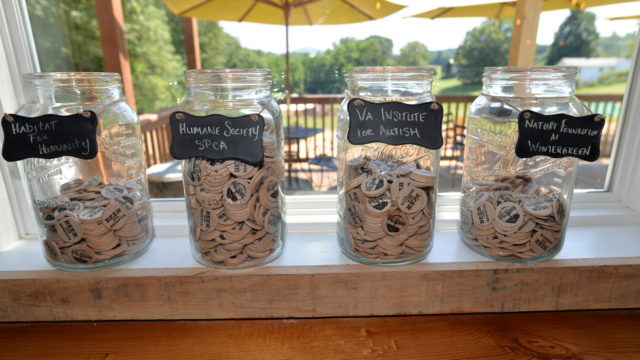
(PINTS WITH PURPOSE: Place a wooden token in the Mason jar to benefit the non-profit of your choice each month)
VCB: You mentioned the environment at The Brewing Tree. You’ve got an outdoor deck overlooking a large gravel-surface patio with a fire-pit, tables and chairs. There’s a scenic view of a mountain peak and rolling green pastures bordered by trees and an old barn. It’s so rural Virginia at its finest. What experience do you want people to have when they visit The Brewing Tree?
Gina Thompson: We want it to be extremely welcoming, comfortable and family-friendly. We want a place where people can come, sit and enjoy themselves while listening to some great music on the weekends. We are dog-friendly, too.
One thing that was very important to Mark and I is that we give back to the community. We have a program called Pints with Purpose. Every three months we rotate four local non-profits. Ten percent of each beer purchased goes to one of the four non-profits. We give the consumer the power to choose. As they purchase a beer they get a wooden nickel and place it in a jar for the charity of their choice.
We’ll always have some sort of animal non-profit benefit from sales. This month it’s the Humane Society/SPCA of Nelson County.
VCB: Mark, you played such an important role with the Virginia Craft Brewers Guild in the past. Will The Brewing Tree become a member?
MT: In fact, I already have rejoined as a brewery-in-planning.
Part of what still interests me having been the Chairman of the Virginia Craft Brewers Guild is the political side of the Guild.
As I said, The Brewing Tree will not can, keg or distribute, but we are going to do the Virginia Craft Brewers Fest because they are able to do a brewery-to-brewery transfer.
I truly believe the timing is right for the breweries of Virginia to be allowed to do what the wineries already do which is to operate under the non-profit distributors license the wineries operate under. I think the wholesalers are ready for that. Wholesalers will put some limitations on that.
Large wholesalers are continuing to consolidate and the number are getting smaller and smaller. They do not want a Brewing Tree-type brewery to approach them and say, “I want you to sell my beer across the state.”
The wholesalers will support allowing a small brewery producing up to 500 barrels of beer doing direct distribution. I’m very interested and very passionate about trying to get another bill passed like I did with SB604 long ago — allowing small breweries to sell their product to the local pub down the street one or two kegs at a time and bypass the 3-tier system in a way the Virginia wineries are already doing. So it’s a proven model that works, and it does not disrupt the 3-tier system. It’s not aggravating the wholesale tier.
Wholesalers have more suppliers, more breweries than they have warehouse space and sales people to be able to sell all of that product.
It’s a very interesting time in craft beer.
WANT TO VISIT?
Brewing Tree Beer Company
9278 Rockfish Valley Highway
Afton, VA 22920
540-381-0990


